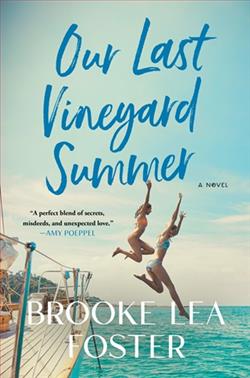
Our Last Vineyard Summer
by Brooke Lea Foster
After suffering through her first year of graduate school at Columbia following her senator father’s death, Betsy Whiting is hoping to spend the summer with her boyfriend…and hopefully end the summer as his fiancée. Instead, her mother—a longtime feminist and leader in the women’s movement—calls Betsy and her sisters back home to Martha’s Vineyard, announcing that they need to sell their beloved summer house to pay off their father’s debts.
When Betsy arrives on the island a week later, she must reckon with her strained familial relationships, a long-ago forbidden romance, and the complicated legacy of her parents, who divided the family even as they did good for the world.
Following a dual timeline between 1965 and 1978, and filled with the vibrant, sunlit nostalgia of the cherished New England vacation setting, Our Last Vineyard Summerpoignantly captures two generations of women navigating love, loss, and womanhood while trying to find the courage to stand up for what they believe in—and the strength to decide if the home they once loved is worth saving.
.
Read
Our Last Vineyard Summer on http://kissnovel.net
Martial Peak Reviews
Brooke Lea Foster's Our Last Vineyard Summer is a poignant exploration of familial bonds, personal growth, and the enduring impact of the past. Set against the idyllic backdrop of Martha's Vineyard, the novel deftly weaves together two timelines—1965 and 1978—to unravel a story that is as much about the complexities of womanhood as it is about the bittersweet nature of change.
At the heart of the novel is Betsy Whiting, a graduate student grappling with the recent death of her father, a senator whose legacy is as complicated as it is influential. Betsy’s summer plans are upended when her mother summons her and her sisters back to their family’s summer home, with the distressing news that they must sell it to settle their father’s debts. This premise sets the stage for a summer of introspection, revelation, and transformation.
Foster’s narrative is rich with emotional depth, capturing the essence of a family at a crossroads. The dual timeline is a particularly effective storytelling device, allowing readers to see the evolution of the Whiting family over more than a decade. In 1965, we witness the early days of Betsy’s parents, whose commitment to social causes often overshadowed their roles as parents. By 1978, we see the impact of their choices on their daughters, particularly Betsy, who is caught between her own aspirations and the weight of her family’s expectations.
The character development in Our Last Vineyard Summer is both nuanced and compelling. Betsy is a relatable protagonist, her struggles with identity and belonging resonating with anyone who has ever felt torn between duty and desire. Her journey is one of self-discovery, as she navigates the complexities of her relationships with her sisters, her mother, and her past love. The supporting characters, particularly Betsy’s mother, are equally well-drawn, their motivations and flaws adding layers to the story.
Foster’s portrayal of the Whiting family is both empathetic and unflinching. She does not shy away from the tensions and resentments that simmer beneath the surface, nor does she gloss over the impact of the parents’ activism on their children. Instead, she presents a realistic portrait of a family grappling with the consequences of their choices, both personal and political. This authenticity is one of the novel’s greatest strengths, inviting readers to reflect on their own familial relationships and the legacies they inherit.
The themes of Our Last Vineyard Summer are universal and timeless. The novel explores the idea of home—not just as a physical place, but as a repository of memories and emotions. The Whiting family’s summer house is a symbol of both comfort and conflict, a place where past and present collide. Foster captures the nostalgia of the New England setting with vivid descriptions that transport readers to sunlit beaches and quaint island towns, evoking a sense of longing for simpler times.
Another significant theme is the struggle for identity and autonomy, particularly for women. Betsy’s mother is a prominent figure in the women’s movement, and her influence is felt throughout the novel. The tension between personal ambition and familial duty is a recurring motif, as Betsy and her sisters grapple with their mother’s legacy and their own desires. Foster’s exploration of these themes is both thoughtful and thought-provoking, offering a nuanced perspective on the challenges and triumphs of womanhood.
In terms of style, Foster’s prose is both lyrical and accessible, striking a balance between evocative imagery and straightforward storytelling. Her ability to capture the subtleties of human emotion is particularly noteworthy, as is her skill in crafting dialogue that feels authentic and meaningful. The pacing of the novel is well-judged, with the dual timeline adding a layer of suspense that keeps readers engaged from start to finish.
Comparatively, Our Last Vineyard Summer shares thematic similarities with works like Elin Hilderbrand’s The Summer of ’69 and Ann Brashares’ The Last Summer (of You and Me). Like these novels, Foster’s story is steeped in nostalgia and explores the complexities of familial relationships against a backdrop of change. However, Foster’s focus on the intersection of personal and political legacies sets her work apart, offering a fresh perspective on familiar themes.
Overall, Our Last Vineyard Summer is a beautifully crafted novel that resonates on multiple levels. It is a story of love and loss, of the ties that bind us and the courage it takes to break free. Foster’s ability to capture the intricacies of family dynamics and the enduring impact of the past makes this a compelling and memorable read. Whether you are drawn to stories of personal growth, familial conflict, or the timeless allure of a summer by the sea, this novel is sure to leave a lasting impression.
























Reviews 0
Post a Reviews: